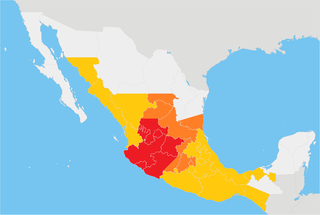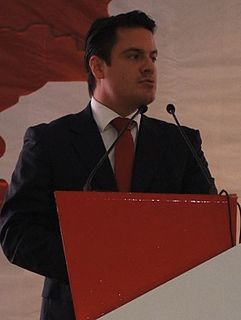Macrolimosna is the name utilized by the Mexican press for the 90 million peso donation (roughly 8 million U.S. dollars) to the Catholic Church by Catholic Jalisco governor Emilio González Márquez in 2008.
The Mexican peso is the currency of Mexico. Modern peso and dollar currencies have a common origin in the 15th–19th century Spanish dollar, most continuing to use its sign, "$". The Mexican peso is the 10th most traded currency in the world, the third most traded currency from America, and the most traded currency from Latin America.

Jalisco, officially the Free and Sovereign State of Jalisco, is one of the 31 states which, with Mexico City, comprise the 32 Federal Entities of Mexico. It is located in Western Mexico and is bordered by six states which are Nayarit, Zacatecas, Aguascalientes, Guanajuato, Michoacán and Colima. Jalisco is divided into 125 municipalities, and its capital city is Guadalajara. Jalisco is one of the most important states in Mexico because of its natural resources as well as its history. Many of the characteristic traits of Mexican culture, particularly outside Mexico City, are originally from Jalisco, such as mariachi, ranchera music, birria, tequila, jaripeo, etc., hence the state's motto: "Jalisco es México." Economically, it is ranked third in the country, with industries centered in the Guadalajara metropolitan area, the second largest metropolitan area in Mexico. The state is home to two significant indigenous populations, the Huichols and the Nahuas. There is also a significant foreign population, mostly retirees from the United States and Canada, living in the Lake Chapala and Puerto Vallarta areas.

Emilio González Márquez is a Mexican politician affiliated with the National Action Party (PAN). He served as Governor of Jalisco.
The donation was to support the building of a sanctuary to honor the Cristero War fighters. Local congresspeople requested the Federal Superior Audit body to determine if the funds had originated from the federation, which would amount to a federal crime . [1] The Secretary of the Interior's office declared itself incapable of auditing the funds. [2] Both the Secretary of the Interior and the Governor of Jalisco are members of the right wing National Action Party.

The Cristero War or Cristero Rebellion (1926–29), also known as La Cristiada[la kɾisˈtjaða], was a widespread struggle in central-western Mexico in response to the imposition of secularist, state atheism, anti-Catholic and anti-clerical articles of the 1917 Mexican Constitution. The rebellion was instigated as a response to an executive decree by President Plutarco Elías Calles to enforce Articles 3, 5, 24, 27, and 130 of the 1917 Constitution. Calles sought to eliminate the power of the Catholic Church and organizations affiliated with it as an institution, and also suppress popular religious celebration in local communities. The massive, popular rural uprising was tacitly supported by the Church hierarchy and was aided by urban Catholic support. US Ambassador Dwight W. Morrow brokered negotiations between the Calles government and the Church. The government made some concessions, the Church withdrew its support for the Cristero fighters and the conflict ended in 1929. It can be seen as a major event in the struggle between Church and State dating back to the 19th century with the War of Reform, but it can also be interpreted as the last major peasant uprising in Mexico following the end of the military phase of the Mexican Revolution in 1920.

The following is a list of governors of the Mexican state of Jalisco from 1921. The current constitution indicates a term 6 years in length, which cannot be renewed under any circumstances. It also stipulates the qualifications for becoming governor: a Mexican citizen by birth, at least 30 years of age, and a resident of Jalisco for at least 5 years prior to election. Elections are held one year after presidential elections.

The National Action Party, founded in 1939, is a conservative political party in Mexico, one of the three main political parties in Mexico. Since the 1980s, it has been an important political party winning local, state, and national elections. In 2000, PAN candidate Vicente Fox was elected president for a six-year term; in 2006, PAN candidate Felipe Calderón succeeded Fox in the presidency. During the period 2000-2012, both houses of the Congress of the Union contained PAN pluralities, but the party had a majority in neither. In the 2006 legislative elections the party won 207 out of 500 seats in the Chamber of Deputies and 52 out of 128 Senators. In the 2012 legislative elections, the PAN won 38 seats in the Senate, and 114 seats in the Chamber of Deputies. The members of this party are colloquially called Panistas.
After public protests, in a private meeting with the cardinal of Guadalajara, Juan Sandoval Íñiguez the governor announced an additional donation of 15 million pesos (roughly 1.3 million dollars) to another Catholic charity organization. He excused the macrolimosna arguing that he was promoting "religious tourism" that would contribute to the economy of the state. He also sent a message to his critics Que chinguen a su madre (the Spanish equivalent of Fuck you). The state's Human Rights Commissioner advised the Governor to apologize. [3] This happened after the Jalisco Human Rights Commission received 403 complaints from citizens in the state. To this Gonzalez responded that he doesn't need to be told what to do. [4]

Juan Sandoval Íñiguez is a cardinal of the Roman Catholic Church, and served as Archbishop of Guadalajara.
Fuck is an profane English-language word which often refers to the act of sexual intercourse but is also commonly used as an intensifier or to denote disdain. While its origin is obscure, it is usually considered to be first attested to around 1475. In modern usage, the term "fuck" and its derivatives can be used as a noun, a verb, an adjective, an interjection or an adverb. There are many common phrases that employ the word as well as compounds that incorporate it, such as "motherfucker," "fuckwit", "fuckup" and "fucknut".
After several public protests, the Cardinal Sandoval advised the Committee pro-construction of the Cristero Sanctuary to return the 30 millions already given. Cardinal Sandoval called the critics of the macrolimosna "radicals". [5]
On June 19, the committee resolved to return the funds. The committee declared that the purpose of the funds was going to be applied to the construction of a hospital, a shelter for visitors and a nursing school, contradicting the Governor's "religious tourism" allegations. [6]
The funds were returned to the government including financial gain that bank gave the church, which was more than half a million pesos.










